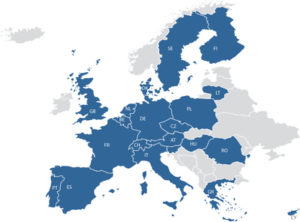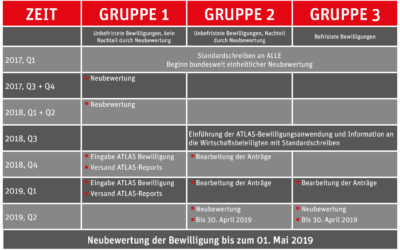The new European Customs Legislation
The Union Customs Code (UCC)
The date of applicability of the UNION Customs Code, 1 May 2016, is already behind us. In doing so, the “new” European customs law replaced the applicable regulations of the Customs Code (CCC) and the associated Implementing Regulation (ZK-DVO). Here you will find a brief summary of the individual legislation that has been crucial to the organisation of customs processes since 1 May.
Whitepaper: Revaluation of grants
Download now our latest white paper on customs reassessment of permits. Learn what the reassessment is all about and what the schedule is.
Objectives of the Union Customs Code
Excerpt from the official text from the EU website:
- Streamlining customs rules and procedures
- Greater legal certainty and consistency for businesses
- more clarity for customs officials across the EU
- Simplify customs rules and procedures and facilitate more efficient customs operations in line with current requirements
- complete conversion of customs authorities to a paperless, purely electronic working environment
- Greater use of accelerated procedures for law-abiding and trustworthy economic operators (authorised economic operators)
UZK Structure
- Title I: General rules
- Title II: Basics for the calculation of levies (e.g. origin, transaction value, etc.)
- Part III: Customs debt and collateral
- Part IV: Transfer to the customs territory of the Union
- Part V: Customs status, transfer, verification, transfer and recovery of goods (e.g. types of customs declaration)
- Part VI: Release of free movement and exemption from import duties
- Part VII: Special procedures (e.g. shipping, customs warehousing, inward processing, etc.)
- Part VIII: Removal of goods from the customs territory of the Union
- Part IX: IT, simplifications, delegation of powers, committee procedures, final provisions
- Annex UCC: Correlation table (Note: comparison between new articles and the corresponding article from the “old” law)
Implementation of the Union Customs Code
 The basic law in the UCC is specified by two further acts. The creation of two separate acts is based on the Lisbon Treaty. It was agreed that a more straightforward and accelerated approach must be found for “non-essential” amendments or adjustments to the basic act. For this reason, a separation has been established between the EU-level procedure (EU Commission + Parliament/Council) and the “more lengthy” comitology procedure with direct participation of the Member States.
The basic law in the UCC is specified by two further acts. The creation of two separate acts is based on the Lisbon Treaty. It was agreed that a more straightforward and accelerated approach must be found for “non-essential” amendments or adjustments to the basic act. For this reason, a separation has been established between the EU-level procedure (EU Commission + Parliament/Council) and the “more lengthy” comitology procedure with direct participation of the Member States.
Delegated Act
The Delegated Ordinance regulates in more detail the passages of the law that deal with what and when (e.g. deadlines, data content, etc.). The content includes provisions relating to general elements of customs, such as assessments and rules of origin. Furthermore, there are also extensive regulations for the digitization of customs processes in the DelVO.
The Delegated Regulation was officially published on 29 December 2015 with the Official Journal of the EU No L 343.
Implementing Ordinance (DVO / IA “Implementing Act”)
The Implementing Regulation regulates, in accordance with Article 291 TFEU(Treaty on the Functioning of the EU), the uniform conditions for the implementation of the UCC, i.e. how.
Annex B to the Delegated Regulation and the Implementing Regulation
In order to be able to submit customs declarations and to transmit the relevant required data in accordance with the law, the content and the respective format must be clearly regulated. In future, Appendix B to the DelVO/DVO will be responsible for this. Annex B sets out the data requirements for each customs declaration. Why is this Annex associated with both legal acts? For the DelVO, Annex B regulates the actual contents of the individual data fields (e.g. indication of the raw mass). For the DVO, on the other hand, Appendix B maps the specifications for formats and field lengths (i.e. how many digits or decimal places has the raw mass = here: n.. 16,6).
Appendix B is included in the DelVO or DVO in the Official Journal L 343 / 2015.
Up-to-date information on the Union Customs Code
UCC: Delays in the notification of new authorisations
The roadmap for the reassessment of authorisations under the Union Customs Code (UCC) actually provided for all authorisations to be reassessed by the end of April 2019. There are currently technical difficulties in printing the new authorisations. The announcement of...
Transitional period until the operational use of electronic systems
Information from Brussels on the proposed amendment to Article 278 UCC Due to various difficulties (resources, timetables, budget, etc.) in the implementation of all prescribed electronic systems or extensions of existing solutions, the Commission has recognised that...
Information from Brussels on Article 74 DelVO
Recognition of the preference for finished products for release to 'free circulation' after 'active finishing' The Commission had not included in the EU Code the possibility of recognising the preferential origin of goods transferred to the procedure for the finished...
Electronic systems in the Union Customs Code (UCC)
One of the equally important changes (Article 6 UCC) is the principle that all notifications, decisions and notifications must be made in electronic form. For this purpose, comprehensive IT solutions must be created in the future or existing systems adapted to the new requirements. All necessary IT systems are listed in the so-called “UZK Work Programme”. In addition to the descriptions of the individual projects, the list also contains various dates. In particular, it is particularly important to specify the date for the end of the development phase and the associated start of real operation. The date entered there forms the basis for the real operation of all parties involved, i.e. EU + Member State systems + applications for economic operators. Thus, the national planning – in Germany for ATLAS – must be based on these dates.
Current status: In consultation with Member States, the Work Programme (UCC Work Programmes) was adopted at a meeting of the Cutsoms Code Committee on 8 March 2016. The final text has now been published and can be found in the Official Journal of the EU L099 of 15 April 2016.
Union Customs Code: Transitional arrangements
In order to transfer all existing processes, simplifications, outstanding processes from the “old” customs world to the “new” era of the UCC in a meaningful and without major frictional losses, various transitional arrangements have been made to the UCC.
Administrative transition
Within the respective final provisions on the DelVO (Article 250 ff.) and the DVO (Article 345 ff.), transitional mechanisms are laid down in particular, which describe in more detail how to deal with or continue with existing authorisations and outstanding procedures. It has also laid down rules on how and by when reassessments of authorisations must be carried out within defined time limits.
Technical transition
As the principle of the use of electronic systems has been established, but some of them are not yet available or do not meet the new requirements, extensive transitional arrangements must be made explicitly in this area. To this end, the European legislator has created the so-called “Transitional Delegated Act” (TDA). The transitional rules there are therefore responsible for the application of the individual legal requirements of the UCC until the necessary IT solutions are available.
The TDA was adopted by Parliament and the Council and the official publication of the TDA was published in the EU’s Official Journal L69 on 15 March 2016.
Whitepaper: Revaluation of grants
Download now our latest white paper on customs reassessment of permits. Learn what the reassessment is all about and what the schedule is.
UZK Guidelines
In order to support the interpretation of the new law and also to better understand the rules, the EU Commission is developing comprehensive guidelines on the UCC. For this purpose, the differences to the “old” law are worked out in project groups for various areas (simplifications, import/export, special procedures, collateral, etc.). There are also clarifications in the guidelines to enable the law to be applied uniformly.
The complete guideline for the UCC + DelVO/DVO will be available on 1 May 2016, the date of the uCC applicability
Important changes in the new European customs legislation
- Total for the flat-rate guarantee = new 10,000 €
- temporary custody
- 90 days deadline for all modes of transport
- Authorisation required
- Security must be provided (exemption from security if applicable)
- ‘exchange of depositors’ within very narrow limits; a criterion = AEO C is necessary
- Registration with exemption must also be granted only under strict conditions
- AEO C necessary
- virtually no longer practicable in exports, as only if no risk data has to be sent
- no longer applicable to procedures 42/45/63
- further simplifications
- Centralised Clearance
- Self-assessment
- Conversion process merges with active finishing
- No more compensatory interest
- Only non-collection procedures left
- No more compensatory interest
- No more pre-purchaser prices = the “last” sale for export to the EU is binding on the transaction value
- Simplifications are very strongly tied to the status of the AEO
Whitepaper: Revaluation of grants
Download now our latest white paper on customs reassessment of permits. Learn what the reassessment is all about and what the schedule is.
Union Customs Code and Implementing Rules
Below are the legal texts currently available from the Union Customs Code, the Delegated Acts (DA; July 2015) and implementing acts (IA; August 2015) including associated appendices.
Union Customs Code (UCC)
Delegated acts (DA)
Your contact to dbh
You have a question?
You have a question? Then write us via our contact form.
Your contact to our sales department
Your contact to the dbh sales department
+49 421 30902-700 or sales@dbh.de
You are interested in our products and consulting or need help with your dbh software? Our sales team will advise you to find the perfect solution for your company.





